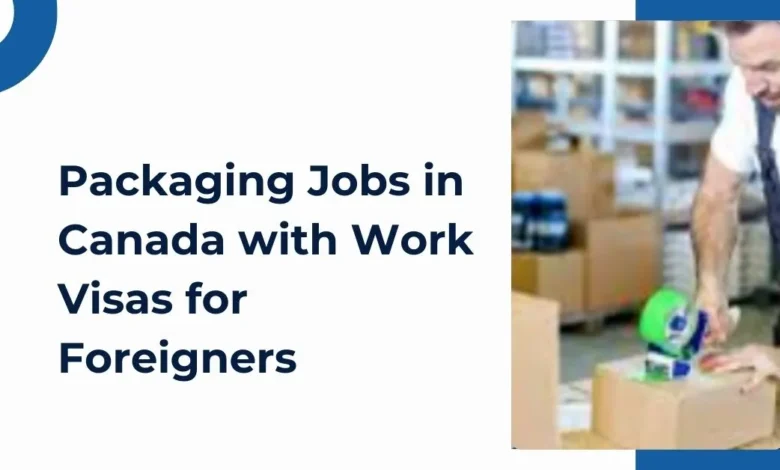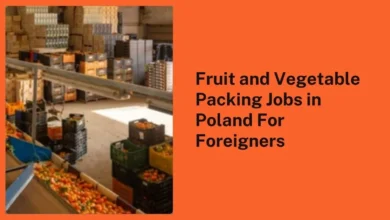Packaging Jobs in Canada with Work Visas for Foreigners

Imagine building a stable, rewarding career at the heart of global trade, with the security of a sponsored visa and the thrill of living in a new country. The UK’s logistics industry is the lifeblood of its economy, and right now, it’s calling for you. With a significant labour shortage creating unprecedented opportunities, companies are actively seeking international talent to keep goods moving.
This is your chance to secure a role with competitive hourly wages starting from £12 and rising to £20, comprehensive benefits like NHS healthcare, and a clear path to long-term settlement. This guide covers everything: from the high-demand roles available and salary expectations to the exact requirements and incredible benefits of working in UK logistics. Your journey to a new life and a thriving career starts here.
Why There is Demand for Packaging Jobs in Canada
Canada’s packaging industry is a critical and growing sector, serving as the backbone for e-commerce, manufacturing, and food production. The demand for skilled packaging workers remains consistently high, driven by broader economic trends and specific labor market needs. For international workers, this creates a significant pathway to employment in Canada, often with employer support for visas.
Key Drivers of Demand:
- The E-Commerce Boom: The massive growth in online shopping has directly increased the need for efficient, secure, and scalable packaging solutions. Warehouses and distribution centers across Canada require a large workforce to pick, pack, and ship products swiftly and safely, making packaging roles more crucial than ever.
- A Robust Food & Beverage Sector: Canada is a major exporter of food products. This industry requires a vast number of workers to package goods in compliance with strict health, safety, and quality standards to ensure freshness and prevent contamination during transport.
- The Shift Towards Sustainable Packaging:Both consumers and regulations are pushing for eco-friendly, recyclable, and reduced packaging. This evolution is creating new specialized roles for workers skilled in innovative, sustainable materials and processes.
- Persistent Labor Shortages: Canada’s tight labor market, particularly in manufacturing, logistics, and warehousing, has led many employers to actively seek international talent. Visa sponsorship through programs like the Temporary Foreign Worker Program (TFWP) is a common strategy to fill these essential roles.
Types of Packaging Jobs Available:
The sector offers a variety of roles, from entry-level positions to those requiring specific technical skills:
- Production/Packaging Line Worker: The most common entry-point, involving sorting, packing, sealing, and labeling products on a fast-paced assembly line.
- Warehouse Packer/Picker: Focuses on preparing customer orders in a warehouse setting, ensuring items are packed securely for shipment and often using inventory systems.
- Packaging Machine Operator: A more technical role involving setting up, operating, monitoring, and performing basic maintenance on automated packaging machinery.
- Quality Control Inspector: Responsible for examining packaged products for defects, verifying weights and measurements, and ensuring all items meet strict company and industry standards.
- Shipping and Receiving Clerk: Manages the flow of goods in and out of a facility, handling documentation, coordinating with carriers, and updating inventory records.
Salary and Compensation Expectations:
- Entry-Level Roles: Positions like production packers typically start at or slightly above the provincial minimum wage, ranging from CAD $16 to $18 per hour.
- Skilled Roles: Machine operators and quality control inspectors with experience can earn between CAD $18 and $24+ per hour, depending on the industry, location, and complexity of the equipment.
- Additional Benefits: Many employers offer comprehensive benefits packages that include extended health insurance, paid vacation and sick leave, overtime opportunities, and retirement savings plans. Some may also provide bonuses, shift premiums for evening/night work, and opportunities for overtime.
Key Job Responsibilities:
A packaging worker’s core duties are designed to ensure efficiency, quality, and safety:
- Preparing, filling, sealing, and labeling packages according to specific guidelines.
- Operating and monitoring packaging machinery and conveyor systems.
- Conducting quality checks to identify and remove defective products.
- Maintaining a clean, organized, and safe work environment following strict health and safety protocols (e.g., WHMIS, GMP).
- Managing inventory, sorting products, and preparing pallets for shipment.
- Collaborating with team members and supervisors to meet production targets.
Requirements for Jobs with Visa Sponsorship:
While entry-level roles are accessible, candidates seeking visa sponsorship should highlight the following:
- Physical Stamina: The ability to stand for long periods, perform repetitive tasks, and lift moderate weights is essential.
- Reliability and Strong Work Ethic: Punctuality and consistency are highly valued in this sector.
- Attention to Detail: Critical for maintaining quality control and accurately following packaging instructions.
- Basic English/French Proficiency: Necessary for understanding safety instructions, training materials, and communicating effectively with supervisors and team members.
- Relevant Experience: Prior experience in manufacturing, warehousing, or logistics is a significant advantage for securing a job offer and visa approval.
- Visa Eligibility: The employer will typically sponsor through the Temporary Foreign Worker Program (TFWP) or the International Mobility Program (IMP). The job offer must meet government requirements, and the candidate must provide necessary documents like a valid passport, proof of qualifications, and a clean medical exam if required.
Key Benefits:
- Legal Work Status & Protections
As a foreign worker with a valid Canadian work permit (e.g., under the Temporary Foreign Worker Program or other relevant streams), you have many of the same legal rights as Canadian citizens/PRs in the workplace. That means legal contracts, protection from abuse, regulated working hours, safety standards, etc. - Competitive Wages
Many packaging jobs pay above minimum wage. Depending on the province and company, entry-level rates may start around CAD 15-20/hour or more, plus opportunities for overtime. - Non-Wage Benefits
Employers often offer additional benefits like- Health insurance/provincial healthcare access.
- Dental, vision, and life insurance in some full-time cases.
- Paid vacation, sick days, and maternity/parental leave where applicable.
- Pension plan (CPP) contribution, employment insurance, etc.
- Health & Safety Standards
Workplaces in Canada are regulated; you’ll get safety training, required protective equipment, regulated breaks, etc. Law mandates a safe working environment. - Visa & Immigration Pathways
Working in Canada can help you qualify for a more stable immigration status later. Experience counts toward programs like Express Entry or Provincial Nominee Programs (PNPs) if you meet the criteria. - Stability & Demand
Packaging/manufacturing/logistics are ongoing sectors. Demand tends to persist, especially in food processing, pharmaceuticals, e-commerce, etc. This helps ensure more steady work. - Flexible Schedules
Many packaging roles have shift work (morning/evening/night), sometimes part-time or seasonal options, which gives flexibility. - Skill Growth
Even simple packaging roles build experience: quality control, inventory handling, and sometimes machine operation. These skills may open doors to supervisory or other roles down the line.
How to Apply for Packaging Jobs in Canada with Work Visas for Foreigners?
- Target the Right Employers:Focus your search on large manufacturing plants, food processing facilities, and logistics/warehousing corporations (e.g., Amazon, Maple Leaf Foods, PepsiCo, etc.), as they are more likely to have experience with visa sponsorship.
- Utilize Canadian Job Boards: Search on Job Bank (the official Government of Canada site), Indeed Canada, and LinkedIn. Use keywords like “packaging,” “warehouse,” “production,” and “visa sponsorship” or “LMIA” (Labour Market Impact Assessment).
- Partner with Recruitment Agencies: Agencies like Randstad, Aerotek, Express Employment Professionals, and TalentWorld specialize in industrial placements and often have contracts with employers who hire internationally.
- Prepare a Canadian-Style Resume:Tailor your resume to highlight relevant experience, physical capabilities, and soft skills like teamwork and reliability. Keep it concise and focused on achievements.
- Secure the Job Offer. First: The visa process is initiated by the employer. Once you have a formal written job offer, your employer will guide you through the necessary steps, which may include applying for an LMIA and then the work permit itself.
Conclusion:
A logistics job in the UK with visa sponsorship is more than just employment—it’s a gateway to a secure future in one of the world’s most dynamic economies. The sector’s critical need for dedicated workers means companies are ready to support your entire relocation journey, from securing your visa to helping you settle in.
Frequently Asked Questions:
-
How long does the Skilled Worker Visa process take?
Typically, from outside the UK, the process takes about 3 weeks once you’ve submitted your application online and provided your biometrics.
-
Do I need to speak fluent English?
You need to prove intermediate-level English (CEFR B1). This is enough for understanding safety instructions and basic workplace communication.



